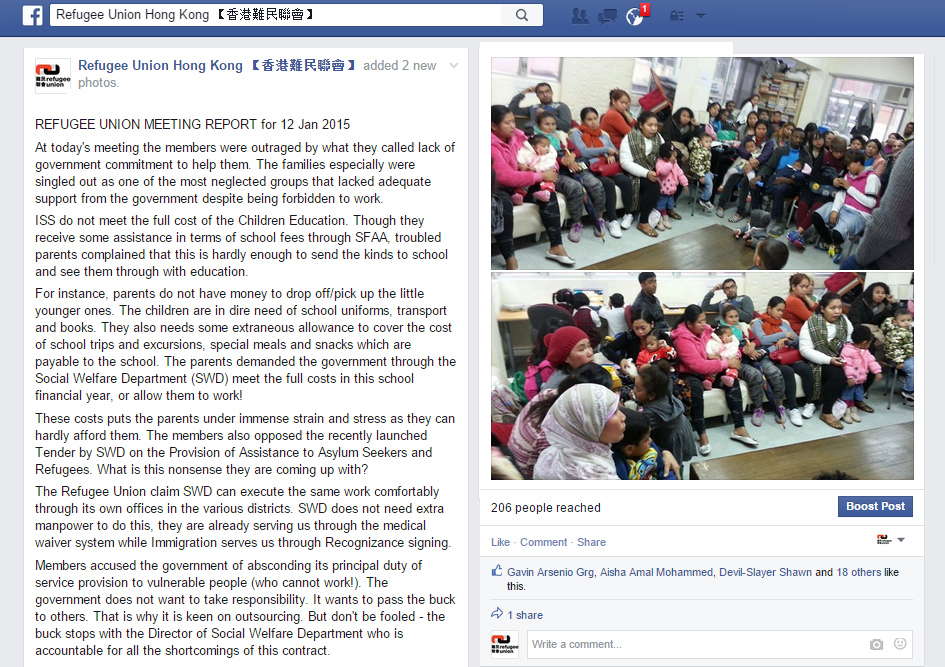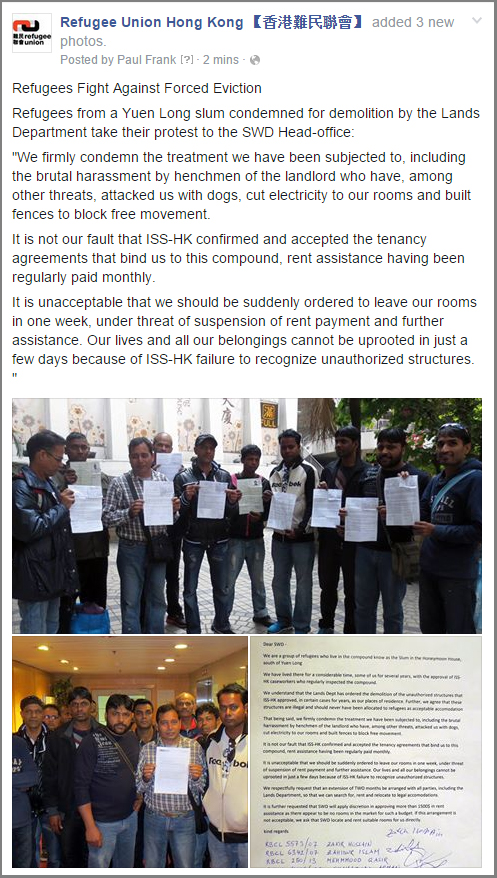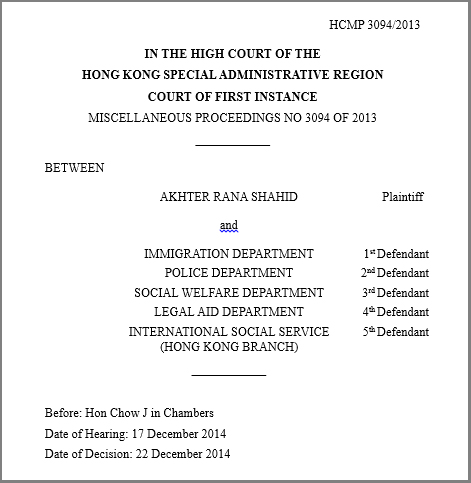The little girl with red eyes
Jan 13th, 2015 | Personal Experiences, Refugee Community, Welfare | Comment
My name is Nashu. I am a Bangladeshi refugee five years in Hong Kong. I want to thank Vision First for helping my people, because before Vision First come show us the way, we Bangladeshi could not speak to HK people who treat us like we don’t count and don’t have any rights. But what is difference between Bangladeshi refugee and African refugee killed by government, I ask you?
Is true that my uncle and my cousins escape to UK same time I came to HK. Last year they returned to Bangladesh with some UK documents after they were accepted as refugees. That is good for them, but there is no hope for me in HK because Bangladeshi never recognized as a refugee by Hong Kong Government.
Many years I live in a slum and I am very angry people say that we choose to live here. Why are we choose to live in slums if we can work and can rent nice room? There are always lies when people are treated like animals and those who don’t care about problem they think and say that poor people choose to suffer like that. Maybe they never talk to poor people.
Now I want to tell you about a very sad thing I see with my own eyes. I can’t feel comfortable and something must change. Near my home there is another slum where a refugee lady lives with her 3 years old daughter. She smoke Ashish (Ganja) because she is depressed and cannot have hope for the future. Her room is 3 x 3.5 feet and small like a car, so the girl breathe the smoke when she is sleeping.
When I visit I see the little girl is like drunk and her eyes are red and not looking normal. She tell me her father is sent by Immigration already back to Pakistan. The mother and daughter are paining very much without him. They are heartbroken I understand. This is real story that happen to many refugee families when Immigration send one parent away and family is broken.
The baby eyes and body movement is not normal. When I hold her I am shocked because her body is too much hurt. I think the baby is sick, maybe fever like that. But my friend tell me it is not fever. He say that after the father send back to his country, the mother is very sad and start to use some drugs at nighttime. When I first see the baby I feel very sad. True she is like a drunk!
What is the girl mistake that she is born in Hong Kong and her father is send away? She is refugee baby but her mother cannot work so cannot have good room and cannot have money to take care for her. They cannot have good future. Who is responsible to protect the human rights of refugee children born on the land of Hong Kong?
Now I tell you reason why refugees sell drugs to pay for rent, clothes, food and other costs. If the refugees sell drugs is because they don’t have job and if the police catch them send them too long time prison for working (15 months) and short time for selling drugs (4 months).
Also selling drugs big money come easy and working time is only few hours. But to do normal job the money is only 200-300$ and the working time is very long from early morning till late at night. So refugees are more scared that police will arrest them. It is law that make some refugee choose the wrong way as we don’t have the legal way to survive in Hong Kong.
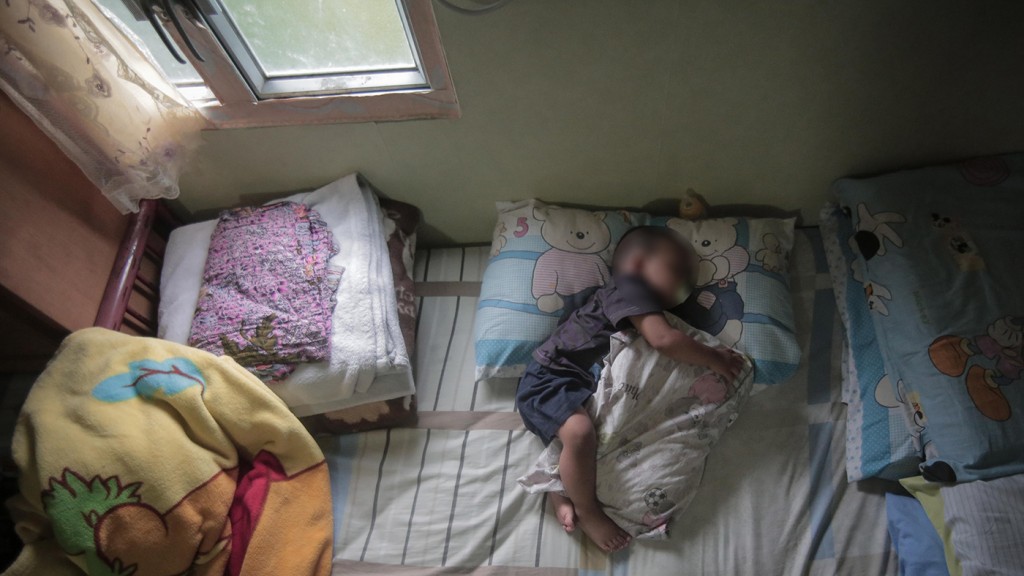
Nothing is more fatal to justice than apathy
Jan 10th, 2015 | Crime, VF Opinion, Welfare | Comment
We call him “Russia”, although his real name is Leo, because he hails from Leo Tolstoy’s country. His experiences and his namesake speak convincingly of an aphorism applicable worldwide and here in Hong Kong: “All that is necessary for evil to triumph is for good men to do nothing”.
Leo sleeps on a sofa at the Refugee Union to avoid being homeless, not owing to this winter cold that barely tickles Russians, but owing to the disgrace of his unavoidable predicament. In fact, upon registration he politely asked if he could sleep on the rooftop to avoid being out on the street.
Urban refugees who either don’t have a home, or don’t have money to pay rent surplus, lament the humiliation of being let down by the authorities that treat them indifferently, to say the least, as if condemning human beings to physical suffering and psychological despair were a customary prerogative of power.
There was a time, and not so long ago, when refugees received no help at all. The dark ages ended in 2006 with the introduction of meagre assistance, but today is hardly a progressive time as welfare seems formulate to include deprivation and punishment. Vision First contends that perhaps ‘no aid’ is preferable to ‘some aid’ because those with much to hope, have nothing to lose in activism.
Let’s consider two aspects, housing and food, before drawing conclusions. First, unrealistic rent assistance force hundreds of refugees into the grip of slum lords, who think nothing of verbal abuse and, in extreme cases, criminally intimidation. Last week, in another extreme case, landlord thugs launched dogs against refugees and threw burning paper into rooms in arson attacks.
Second, failed food distribution generates a host of alarming practices: the widespread and mysterious phenomenom of deminishing rations; substandard and undesirable products that encourage the ‘revolving door scam’; profiteering through questionable merchandising practices, and inferior or rotten produce; and, in one extreme cases, distribution of contraband milk.
Vision First is reluctantly becoming the reporter and repository of ‘extreme cases’ that seem to shed their extremeness as they increasingly become more prevalent and less surprising. Refugee victims regularly file police reports, but lament that perpetrators avoid prosecution as demonstrated by the persistence of their actions. Are certain social groups fair game for abuse?
Apathy in law enforcement is indicative of a selective application of law and order, as resident victims might arguably experience a swifter and less biased application of criminal law. Beyond apathy, it is the way laws and regulations to upheld justice at times work against the justice they should upheld, to the point that the police might be less inclined to pursue local goons when they can take an easy shot at people perceived as enjoying lesser human rights.
Thus, are refugees perceived as second-class victims already submerged in criminality? Is their victimization tolerated within the culture of rejection? Why does guilt seem to circle back to them? Do we all share the blame in turning a blind eye to such developments?
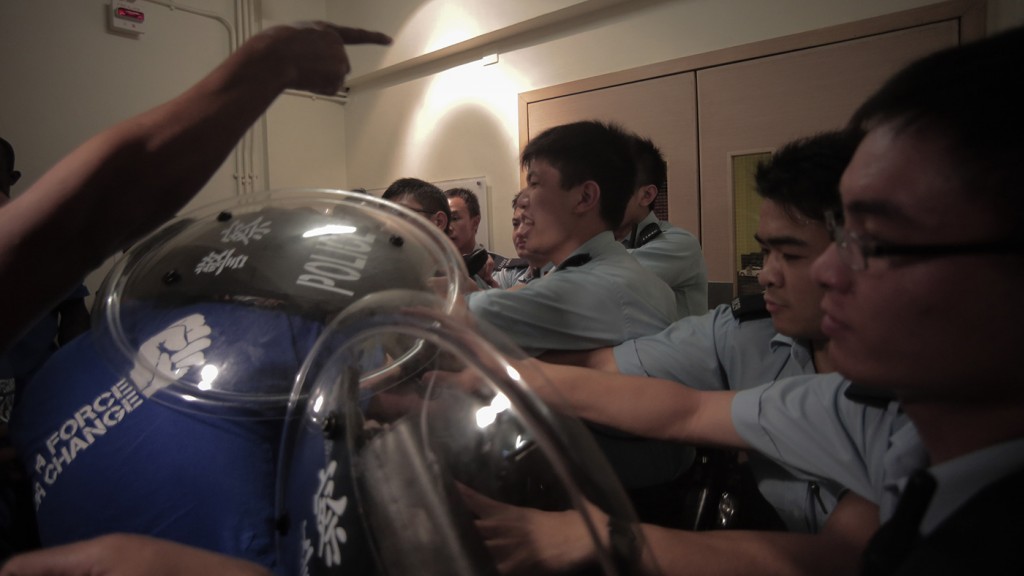
Refugees fight against slum eviction
Jan 9th, 2015 | Housing, Refugee Community, Welfare | Comment
Link to VF report on the Slum in the Honeymoon House closing down
ISS approved this slum for 7 years and now they want us to leave in 7 days. We don’t like to live in these bad conditions, but we cannot work and do not have money to rent good room. Before I tell my (ISS-HK) officer, I say outside homes in Yuen Long are very expensive. Maybe room cost 2000$, so how we rent for 1500$ budget ISS give us? He say to me, ‘Not my matter. Not my problem’ … So what we do? Should we be homeless because Hong Kong Government, Social Welfare Department and ISS refuse to provide home, refuse to increase refugee rent allowance and refuse refugee from working? This is why we come today to protest at the Social Welfare Department main office because this is shameful treatment of refugees.” – Aziz, refugee in Hong Kong since 2006
Can this girl survive on 120gr of formula?
Jan 8th, 2015 | Food, Welfare | Comment
Vision First reported to the Social Welfare Department the case of a refugee girl, Shamea, whose parents said only receives 4 (four) cans of baby milk formula from the government contractor each month. This quantity might have been sufficient when she was an infant, but are 120 grams of formula sufficient when she turns 3 next month and no other food is provided?
The Srilankan father and Indonesian mother report they were confronted by a wall of indifference as they pleaded with three different caseworkers, over three years, who all stringently stuck to the line that the formula was all the girl required and the parents should share their rations with her!
Vision First is appealed that an utter disregard for the physical needs of young children is displayed, despite the SWD assuring that food allowances for refugees are carefully evaluated by nutritionists of the Health Department to guarantee the health and wellbeing of refugees, both adult and children. If that is so, how are these incongruences explained? Where else in society do children aged three subsist on baby formula alone, besides it being insufficiently provided?
The parents are deeply distressed. They are keenly aware that refugees are not allowed to work and of consequence food rations are their lifeline. On 7 January 2015, Vision First received three such complaints from similarly distraught mothers. Does this evince a covert policy to punish refugee families by making life difficult for their children? We would want to hope this line of thinking is too cruel to be even taken into consideration.
But, the SWD receives copies of the monthly food distribution sheets. Considering the known age of children, doesn’t the SWD question whether rations are sufficient for each age group? The SWD cannot raise ignorance as an excuse when the data is in front of their eyes.
We query: Is the SWD indirectly encouraging parents to work illegally? Will the SWD step forward to defend parents compelled to earn money to supplement welfare? Why do present welfare policies, supposedly formulated on humanitarian grounds to prevent destitution, manifestly fail to reach such an objective?
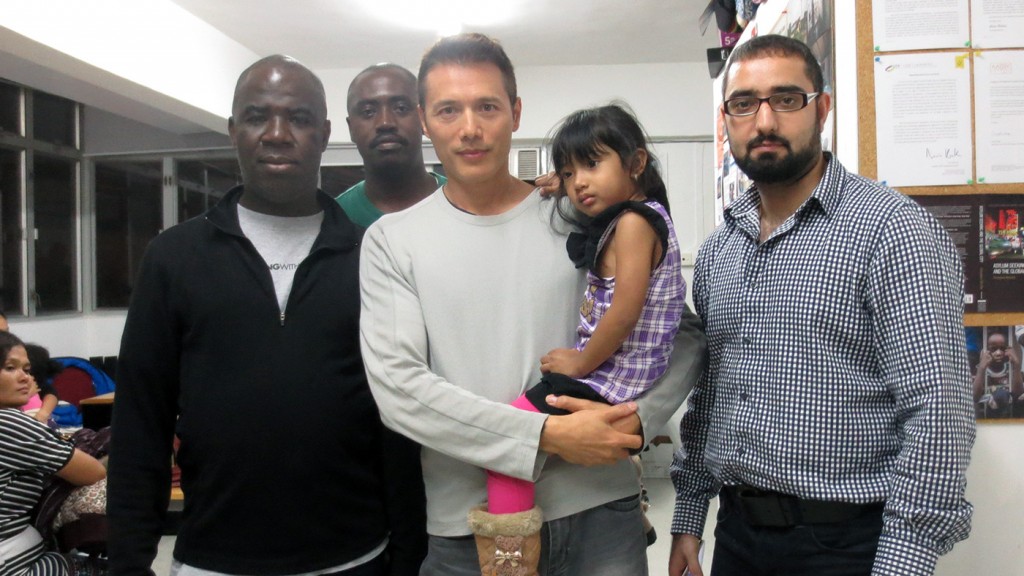
Refugee child denied standard level of assistance
Jan 6th, 2015 | Food, Housing, Welfare | Comment
A few days ago Vision First wrote to the Child Protection institute querying if they had taken into consideration refugee children when writing to the SCMP saying the government is doing all it can to prevent destitution. Apparently, if the government is, its contractors are not.
Vision First reported to the Social Welfare Department the reprehensible treatment of a refugee child who has been allegedly denied rent, utility and adequate food assistance for reasons unexplainable. The boy, Samuel, was born in 2013 to a Pakistani father and Indonesian mother.
Samuel was issued with an Immigration Recognizance Form in August 2013, after which the parents requested he be added to their Agreement on Provision of Assistance. However, the mother laments, “Our caseworker refused to add our boy, because she said it was not necessary and we already got enough help.”
For reasons that remain unclear, young Samuel was not recognized by SWD contractor ISSHK as a ‘service user’ entitled to standard levels of assistance for rent, utilities and food, as determined by the Hong Kong Government. Raising a family is expensive and refugee parents are denied the right to work.
At the core of the matter was the parents’ request to change their lodging because the room in which they lived had become too small for a unit of three. They therefore located what they thought could be a suitable room priced at 4500$. However, since August 2013 the family was told by their ISSHK case-worker that the small room they occupied was sufficient and it was unnecessary for them to relocate. The caseworker (name withheld) refused to pay the security deposit and first month rent.
The family reports that ISS-HK also did not increase the electricity allowance and failed to provide sufficient food for Samuel. In recent months, the two year-old boy was allocated one box of cereal, one can of milk formula (900gr) and 10 eggs for a 10 day period. The mother, who could not breastfeed, laments that her son would finish the formula in 5 days as he didn’t have solid food.
The distress mother complained to Vision First, “This is too much painful. Why they can treat us like that?”
Good question! From our experience, it is claimed that each case is different and a case-by-case assessment is implemented, as if this was reason sufficient to dispel complaints concerning some receiving more and others less than what is said not to exist, but is factually a “Refugee Welfare Package”. In this light, Vision First is greatly concerned about what seems to be an arbitrary, biased treatment, particularly because the family claims they were told “the manager did not agree” as an explanation of service refusal.
Vision First calls on the SWD to promptly investigate this case and explain to this family, and the community in general, what guidelines are in place in this cases, why ISS-HK decided that this family should not move to a larger room after having a baby, why their utility allowance should not be increased and why Samuel was punished with a reduced food allowance at a critical stage of growth and development.
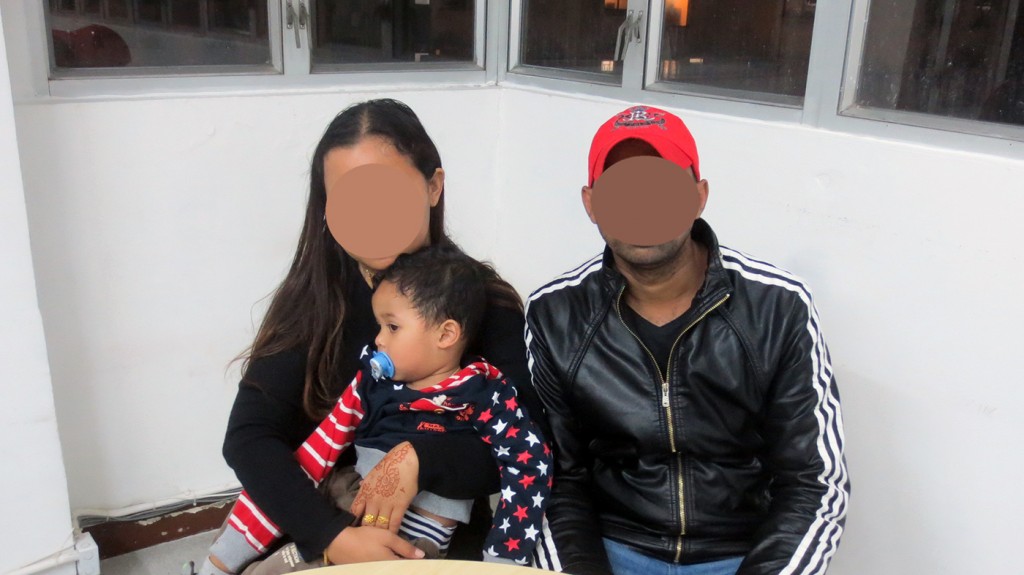
Lone Ranger battles asylum failures in court
Jan 3rd, 2015 | Legal, VF Opinion, Welfare | Comment
The emergence of the refugee activist is contagious! Over 2013 and 2014, Mr. Akhter Rana Shahid filed complaints against several government departments and the ISS-HK for these bodies were argued to have failed to protect him. The complaints were dismissed.
We do like to take this opportunity to contribute our views as the matters raised by the plaintiff are, we believe, of public concern. Although we haven’t had the pleasure of meeting Mr. Akhter Rana Shahid, we think the grievances dismissed by the Court of First Instance in HCMP 3094/2013 may not be as frivolous and vexatious as they certainly appear at first sight to unconcerned readers.
The following considerations should be made.
First, while the plaintiff filed separate complaints against the Immigration Department, Police, Social Welfare Department, Legal Aid and the ISS-HK, there seems to be a common thread that unites them: the lack of a comprehensive asylum procedure that causes refugees intolerable hardship. Some failures were listed by the seven originating summons, interestingly against some of the agencies at the forefront of the government attempt to contain, or simply manage, the asylum ‘problem’. In this vein, we are left with the uncomfortable feeling that the confused and scattered issuance of summons, as well as the unclear arguments put forward by the plaintiff, alleging circumstances that seem to miss the point though sound plausible, may be explained by the lack of legal representation. A paucity of Legal Aid approvals and the rarity of pro-bono support are issues that undeniably thwart refugees who resort to legal proceedings in person, hoping to find a sympathetic ear and justice. It is significant that on the one occasion that Mr. Shahid had legal representation he was awarded compensation for unlawful detention.
Second, in the burglary case, it is unclear how the investigation unfolded, but two issues seem clear. The plaintiff alleges he found a burglar in his home, and the burglar was surprisingly his landlord. Whether this person was in cahoots with ISS-HK is debatable. What seems plausible is the fact that, for political reasons, refugees are placed in a state of vulnerability that is implemented by ISS-HK, thereby drawing upon this agency the ire of refugees, with a predictable eruption of problems and confrontations. Further, the ISS-HK services, or lack of, can be said to cause innumerable disputes between refugees and bottom-tier landlords. It is accepted that refugees are compelled to settle in certain rooms, and at certain restrictive conditions, due to insufficient rent assistant. It is not new to us that some landlords take justice into their own hands and, if rent is not on time and in full, think nothing of threaten tenants, cutting electricity and water, locking them out of their homes and even stealing from them, safe in the knowledge that refugees (women in particular) often hold back from reporting such criminal behaviour to the police. When reports are made, police intervention generally dismiss such incidents as ‘personal matters’.
Third, the background situation raises grave concerns about the well-known problem of the welfare assistance to refugees being wholly inadequate. The glaring shortcoming is predicated on the misguided rationale that such benefits are indeed not welfare, but humanitarian assistance provided in-kind and only in a measure sufficient to prevent destitution, while discourage hopeful asylum seekers from coming to Hong Kong. The logic of this political decision is challenged by the evidence of widespread suffering across the refugee community, hardly justifiable by deterrent objectives. Despite a shameful reality plain for anyone to observe, inhumane policies and practices persist. Further, the ISS-HK and SWD assistance package is rarely vigorously challenged in court where the judiciary commonly takes the view of its sufficiency, as in the numerous cases of refugees convicted for taking up employment merely to pay rent and buy food. One can only query why and to whose advantage?
Fourth, while it is the duty of the Legal Aid Department to assess the merits of each application and prevent the waste of public funds in frivolous and vexatious claims, it is doubtful that Mr. Shahid was in a position to present full particulars and evidence in a professional manner without the assistance of a lawyer. We are not told the details, but a few questions come to mind: Did the police readily furnish records of the burglary investigation? And did ISS-HK provide details of partial rent payments that precipitated the plaintiff’s relationship with his landlord? Logic presumes that, if refugees are to be banned from working, then Hong Kong government should arrange accommodation and, if necessary, pay rent in full. Did the plaintiff make this critical connection clear to Legal Aid? Can refugees acting in person in court be reasonably expected to grasp legal requirements and procedures? That is, should they know how to present cases by themselves against well represented defendants? Can anyone in such a fraught state of mind (i.e. feeling persecuted at home and in HK) produce a compelling case to take on the Justice Department alone?
Ultimately, we believe that something important should be learned from Mr. Shahid’s troubles. His legal actions, though defeated, make public the desperation of a refugee who attempted in several ways to find a place in society and relied consistently on the authorities to be treated fairly. Each time he was frustrated by the lack of justice, actual or perceived, that he believed he deserved. It seems obvious that there is a mismatch between his reasonable expectations of living in a fair and just society, developed by any standards, and the reality of finding himself in a place that intentionally dehumanized him. Government deterrent policies against asylum seekers might be effective in disillusioning present asylum seekers, but why do asylum seekers keep coming and arrive with little or no knowledge of actual conditions? In such light, are the prevailing deterrent measures failing? Or is the deterrent rationale simply a measure to punish those already seeking asylum in Hong Kong, rather than discouraging others from making the journey?
Comments to SWD replies to enquiries to tender
Dec 11th, 2014 | Advocacy, Food, Housing, VF Opinion, Welfare | Comment
On 3 December Vision First sought SWD clarification on the following points after we were invited to the tender. Vision First finds these replies largely unsatisfactory.
Comment to A.1
We question whether SWD is mistaken by operating on the assumption that refugees seek their own accommodation. SWD echoes the views previously heard from ISS-HK that the majority of refugees living in slums choose to live there and don’t want to move out. While it is true that nobody is coerced to make a home in the slums, huts were and continue to be the only locations rentable at the price point offered to refugees (currently 1500$ a month). Further, Vision First reported that the February 2014 rental increase from 1200$ to 1500$ caused ‘slum inflation’ evidenced by slum lords demanding rental increases to this day.
It is painfully obvious that the ‘persuasion process’ has limited to no effect if the rental parameters remain unchanged. In the urban areas, ISS-HK case workers frequently visit rooms, often before payments are confirmed or released. However, in agricultural-use compounds it appears, from evidence collected from refugee tenants, that slum lords and caretaker can swiftly complete transactions and have contracts approved in one visit to the ISS-HK Tsuen Wan branch.
Unlike in the urban area, security deposits and property agent fees are not required, which is a considerable financial advantage. Urban dwelling refugees report endless negotiations between reluctant landlords (refugee tenants are undesirable), property agents and case workers before any deal is completed. Why are basic legal rooms harder to rent than dodgy ones in illegal structures?
As a result large clusters of co-national refugees end up over the years in the same area. Do these men, women and children volunteer to live in dumps, or were they deprived of better alternatives?
Slum refugees are decent human beings who are not so foolish as to PREFER slums for themselves and family, if better and affordable alternatives are available.
Anyone accusing refugees of CHOOSING TO LIVE IN THE SLUMS is politically motivated and could not justify such a preposterous position in a public forum of hundreds of deprived refugees forced to live in slums, many for over 5 years. If SWD truly believes what they are saying, Vision First challenges the SWD to a public debate to support such argument before the media.
It is manifestly obvious that if refugees were provided alternative housing arrangements in legal structures in the area where they live, or in other areas close to friends and co-nationals, they would certainly move out of the slums. We have witnessed this happen on many occasions.
Comment to A.2
Thankfully the in-kind food program that exposed thousands of refugees yearly to exploitation by the operators of the food distribution chain is coming to an end. While doubting the coupon system will mark any significant improvement, Vision First cannot but interpreter SWD decision to suddenly close down the in-kind food mechanism as to be a significant statement, tantamount of an admission that not all was well in previous arrangements. It remains to be seen if law enforcement agents will take action against perpetrators of illegal activities as exposed and reported by Vision First over the last two years. Sun Tsu said: “The wheels of justice grind slow but grind fine”.
Comments to A.3
Outsourcing by its own nature creates numerous monitoring problems. Contractors worldwide cannot generally be trusted to deliver top services without strong and independent supervision. In this respect SWD’s reply is unsatisfactory. Vision First respectfully advises SWD to appoint a full-time inspection team that operates in the field all day taking leads and invitations from the refugee community quite independently from its contractors.
Many doubts come to mind. How is SWD going to implement “service inspection and performance evaluation”? How often and who will be doing this? Does this include visiting refugees at their homes, to make sure they effectively live in safe and hygienic conditions, contrary to what SWD might be told by its contractor?
Vision First will increase its watchdog role to protect the interests of refugees and report service failures. We will monitor service delivery in the three regions to ensure that demonstrable errors of the past are not repeated and do not again become systemic problems.
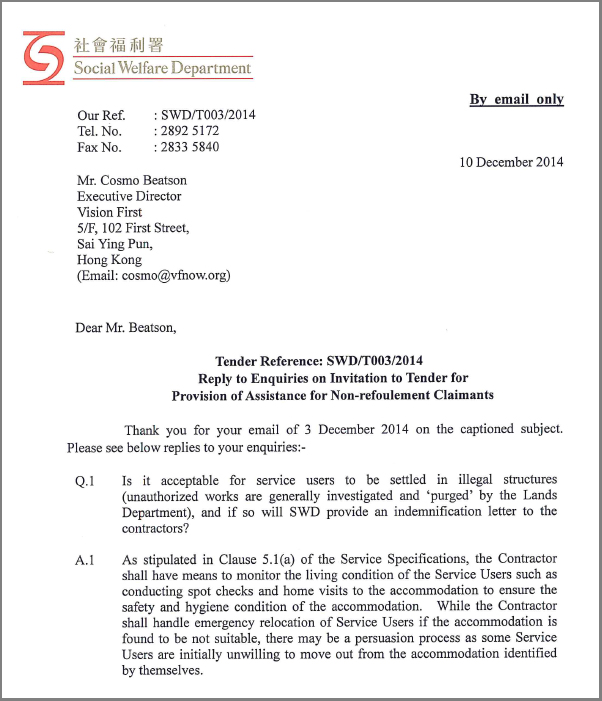
Illegal activity at the ISS-HK appointed Safwan Provision Store
May 30th, 2014 | Advocacy, Food, VF Report, Welfare | Comment
Reliably sources close to the ISS-HK food team, informed Vision First that in late 2013 Hong Kong Customs mounted a special operation to combat the cross-boundary smuggling of illicit cigarettes and distribution of cigarettes in the Yuen Long area.
Customs agents raided Safwan Provision Store, one of the ISS-HK appointed shops in Yuen Long, where it is reported that they seized 500,000 cigarettes smuggled into the city without payment of stamp duty.
Vision First was also told that a shop partners was convicted for the offense and jailed for 2.5 months, as well as fined 1.8 million dollars. It is rumored that only one of the two partners took the fall for the illegal merchandise stacked in the storage, while the other continued to run the business.
The refugee community reports that illicit cigarettes are currently available at the same location, and from there allegedly distributed to numerous ethnic grocery shops across the territory.
Vision First was further informed that ISS-HK, claiming that contraband cigarettes are not related to the food business, did not terminate Safwan’s contract for the distribution of food rations to approximately one thousands refugees. We hope this decision was well pondered and wisely made.
However, Vision First has been informed by the refugee community, that the same shop is distributing milk that many refugees believe to be smuggled. It is indeed plausible that a trading company that smuggles one product might also be smuggling others.
Thoughtful consideration should also be given to the 1.8 million dollar fine, a loss that owners would seek to recover most rapidly, perhaps even cutting corners in food related services.
Refugees informed Vision First that Safwan is distributing smuggled milk to ISS-HK clients.
SAFA Milk is produced by Gulf & Safa Dairies Company in Dubai, UAE. Informed sources told Vision First that this brand of milk is currently being provided to refugees, a brand of milk that we have researched is not licensed for consumption in the territory.
Information on the package obtained by Vision First is problematic: the 3.0g fat content is lower than the minimum 3.5g required by law; the address of the Hong Kong distributor is missing; the nutritional information does not comply with the Hong Kong “chat ga yat” or “seven plus one”.
Our research confirms that reconstitute SAFA milk from dairy cows in the desert country of the United Arab Emirates is not licensed for importation, distribution or consumption in Hong Kong. This situation raises a red flag not only about Safwan’s business methods, but also about the SWD and ISS-HK welfare practices.
Further and in addition, the refugee community is concerned that ISS-HK selected SAFA milk for the food rations distributed by all three ISS-HK branches to refugees requiring emergency provisions. Could this relate to the fact that it might be the cheapest milk as it bypasses regular import channels?
It is assumed that management of the ISS-HK food team is fully aware of irregular labels on SAFA milk packaging that would manifestly strike any professionally trained eye at first glance.
In this regard, we can only hope that no offence has been committed by ISS-HK and the refugee community is not again object of unscrupulous exploitation. However, the evidence seems to indicate otherwise.
Vision First urges relevant government departments, including Hong Kong Customs, to urgently investigate these allegations and ensure that the health and safety of refugees is not compromised by prohibited practices.

Complaints mount against Safwan Provision Stores
May 30th, 2014 | Advocacy, Food, VF Report, Welfare | Comment
Vision First received numerous complaints against Safwan Provision Store, appointed by ISS-HK to provide food rations, paid by the government purse, to approximately 1000 refugees who live in the Yuen Long area.
It is unclear why more complaints are raised against Safwan than the other six ISS-HK stores. Perhaps this relates to the Pakistani proprietors refusing to address complaints and instead exasperating refugees with taunts like, “Go and complain to the Refugee Union, see if I care!”
Provided with two rotten apples for a ten day period, a refugee lady protested, “You see, it is black. How do I eat this?” The shopkeeper taunted her, “OK, this apple, you give it to the Refugee Union and complain! What will the Refugee Union do to me?”
The rations supplied are of such substandard quality that reportedly half of the refugees take cash instead. The transaction is arranged by first signing collection notices at the designated shop at Chun Chu House, and later getting cash at another Safwan store in the Hope Yick Commercial Center, also in Yuen Long.
This arrangement defrauds Hong Kong Government by discounting 10-day food rations, originally valued at 400$, to approximately 160$ depending on items selected. This results in 1200$ monthly food rations being worth 480$ in the hands of refugees, with a 720$ mysterious loss to tax-payers.
Only a voucher system guarantees the eradication of fraud in the food distribution system.
Sources familiar with ISS-HK food distribution informed Vision First that Safwan doesn’t provide refugees with traditional basmati rice (13$/Kg), but instead mixes Pakistani ‘PK365’ rice (9$/Kg) with a cheap Vietnamese variety (3$/Kg). This is done when repackaging rice into 5Kg bags for ISS-HK clients.
A refugee mother complained, “This is old rice. It smells like cooking gas [methane]. After cooking it smells very bad and taste bad. The colour is very white, as it is bleached again. The package says Basmati Rice, but it is regular rice. We know the difference because we eat rice since we are babies.”
The quality of the bread is equally dreadful and packages are often distributed 2 days before expiry dates for a 10 to 12 day period. Perhaps refugees are expected to gorge themselves and then starve until the next collection. On 15 May 2014, Safwan gave a refuge mother a bag of bread that had been chewed through by a rat.
The majority of refugees cannot read English and are unable to verify what items are delivered by the shop. This explains complaints whereby refugees might collect “Fish” instead of “Halal Chicken”, because collection notices are typed in English and claimants are too shy to ask for help.
The best many refugees can do is count the items on the collection notices and ensure they correspond numerically to the items collected. Any discrepancy in foodstuff is ascribed to case workers having mixed up the order and unscrupulous shopkeepers can swap items with impunity.
With regard to the unlicensed Safa Milk, refugees noticed that other legitimate brands are kept on the shelves in view of CCTV cameras, while cartons of Safa milk are placed into the grocery bags at the time of collection. The construction of the shelving unit is such that video cameras, viewed by ISS-HK through web connections, are unable to record the entire transaction.
It is hard to understand why ISS-HK is unwilling or unable to monitor dodgy practice at Safwan.



